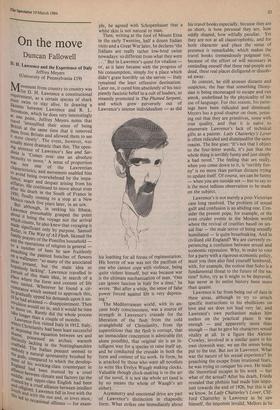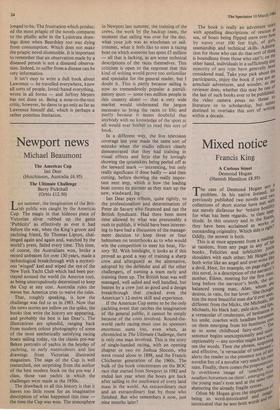On the move
Duncan Fallowell
B• H. Lawrence and the Experience of Italy Jeffrey Meyers
(University of Pennsylvania £19) ovement from country to country was M
for D. H. Lawrence a constitutional requirement, as a certain species of shark Must swim to stay alive. In drawing a Slikeness between Lawrence and R. L. tevenson, which he does very interestingly one point, Jeffrey Meyers notes that tral 'intensified their sense of being British at the same time that it removed them from Britain and allowed them to see It more clearly'. The event, however, was usually more dramatic than this. The open- ing sentence of Lawrence's Sea and Sar- dinia is 'Comes over one an absolute necessity to move.' A sense of proportion Was not one of the Lawrentian characteristics and movement enabled him to avoid being overwhelmed by the impa- tienee, anger and despair arising from his of te afflatus. He continued to move about even
r his death in the South of France in 1930, finally coming to a stop at a New Mexico ranch five years later, in an urn.
But although, in seeking his Ithaca, Lawrence presumably grasped the point about it being the voyage not the arrival which counts, he also knew that voyaging is Made significant only by purpose. Samuel Butler, in The Way of All Flesh, likened the family prayers of the Pontifex household — .and the operations of religion in general t0 a number of bees he saw fruitlessly assaulting the painted bunches of flowers 911 a wallpaper: `so many of the associated .ideas . present, but the main idea so hopelessly lacking'. Lawrence travelled in Pursuit of this main idea, in search of a Place where the form and content of life Were united. Whenever he found a cir- e,urnstanee which seemed to approach this, .n.e, gradually upped his demands upon it un- _in he had attained — disappointment. Then revulsion would set in, and it would be time t. Move on. Rarely did the whole process `'`Ke longer tanal
an a couple of months.
where first visited Italy in 1 912. Italy, irt. Christianity had been least successful shame the equation between sex and distinctly Possessed an archaic warmth c isti ,,,,,,I-1.ctlY lacking in the Nottinghamshire es'irreld. The Italian peasant seemed to the l3c1Y a natural spontaneity brushed by rwe- gOds , , compared to which the develop- England of his working-class counterpart in alrgi4nd had been stunted by a cruel nlii,ce between climate and factory (as the stuudle- and upper-class English had been ancilltecil. bY a cruel alliance between intellect Son religion). Lawrence fell in love with the v_I. Eh and with the sun and, a must, ns led to occasional silliness s loves— for exam-
ple, he agreed with Schopenhauer that a white skin is not natural to man.
Then, writing at the foot of Mount Etna in the early Twenties, half a dozen Italian visits and a Great War later, he declares 'the Italians are really rather low-bred swine nowadays: so different from what they were ...' But in Lawrence's quest for vitalism or, as it later became with the progress of his consumption, simply for a place which didn't grate horribly on the nerves — Italy remained the least offensive destination. Later on, it cured him absolutely of his inci- piently fascistic belief in a cult of leaders, so steamily promoted in The Plumed Serpent, and which grew perversely out of Lawrence's intense individualism — as did
his loathing for all forms of regimentation. His horror of war was not the pacifism of one who cannot cope with violence, being quite violent himself, but was because war is the ultimate mechanisation of man. 'One can ignore fascism in Italy for a time,' he wrote. 'But after a while, the sense of false power forced against life is very depress- ing.'
The Mediterranean world, with its an- cient body consciousness, was a source of strength in Lawrence's crusade for the liberation of the flesh from the cold stranglehold of Christianity, from the superstitions that the flesh is corrupt, that an immaculate conception is admirable (let alone possible), that original sin is an in- telligent way for a species to raise itself up, and he conducted the crusade in both the form and content of his work. In form, he is attacked by those who want all novelists to write like Evelyn Waugh making clocks. Valuable though clock-making is to the art of the novel, it is not the whole art (and is by no means the whole of Waugh's art either).
Asymmetry and emotional drive are part of Lawrence's distinction in rhapsodic form. What strikes one immediately about his travel books especially, because they are so short, is how personal they are, how oddly shaped, how wilfully peculiar. Yet they are not at all claustrophobic, and for both character and place the sense of presence is remarkable, which makes the travel books tremendously poignant too, because of the effort of will necessary in reminding oneself that these real people are dead, these real places disfigured or dissolv- ed away.
In content, he still arouses distaste and suspicion, the fear that something Diony- sian is being encouraged to escape and run amok, underlined by the physicality of his use of language. For this reason, his paint- ings have been ridiculed and dismissed. Meyers has a good chapter on them, point- ing out that they are primitives, some with true quality, and that it is naive to enumerate Lawrence's lack of technical gifts as a painter. Lady Chatterley's Lover is often ridiculed and dismissedfor the same reason. The line goes: 'It's not that I object to the four-letter words, it's just that the whole thing is terribly funny and just simply a bad novel.' The feeling that sex really, when you come down to it, is 'terribly fun- ny' is no more than puritan distaste trying to update itself. Of course, sex can be funny — when you are outside sex — but to say so is the most tedious observation to be made on the subject.
Lawrence's is not merely a post-Victorian case long resolved. The problem of sexual guilt and confusion is an abiding one. Con- sider the present pope, for example, or the even cruder events in the Moslem world where the revival of cruelties based on sex- ual fear — the male terror of being sexually humiliated — is quite breathtaking. And in civilised old England? We are currently ex- periencing a confusion between sexual and economic repression. Why, in order to vote for a party with a rigorous economic policy, must you then also find yourself lumbered, with, for example, the notion that Soho is a fundamental threat to the future of the na- tion? Soho, try as it might to be depraved, has never in its entire history been more than quaint.
Lawrence is far from being out of date in these areas, although to try to attach specific instructions to his ebullitions on love and sex does not lead very far, and Lawrence's own puritanism makes him useless on the practical plane. It was enough — and apparently more than enough — that he gave his characters sexual vitality at all. In a figure like Aleister Crowley, involved in a similar quest in his own clownish way, we see the senses being put to the test. But not in Lawrence. What was the nature of his sexual experience? In preaching the escape from irrational fears, he was trying to conquer his own. He made the theoretical escapes in his work — but what of the actual? After his death, Frieda revealed that phthisis had made him impo- tent towards the end of 1926, but this is all we know. In Lady Chatterley's Lover, Clif- ford Chatterley is Lawrence as he saw himself, the impotent invalid, Mellors as he
longed to be. The frustration which produc- ed the most priapic of the novels compares to the phallic ache in the Lysistrata draw- ings done when Beardsley too was dying from consumption. Which does not make the priapic novel dismissible. It is important to remember that an observation made by a diseased person is not a diseased observa- tion. Indeed, to suffer from a disease can be very informative.
It isn't easy to write a dull book about Lawrence — he travelled everywhere, knew all sorts of people, loved/hated everything, wrote in all forms — and Jeffrey Meyers has not done so. Being a nose-to-the-text critic, however, he dares to go only as far as Lawrence himself did, which is perhaps a rather pointless limitation.







































 Previous page
Previous page